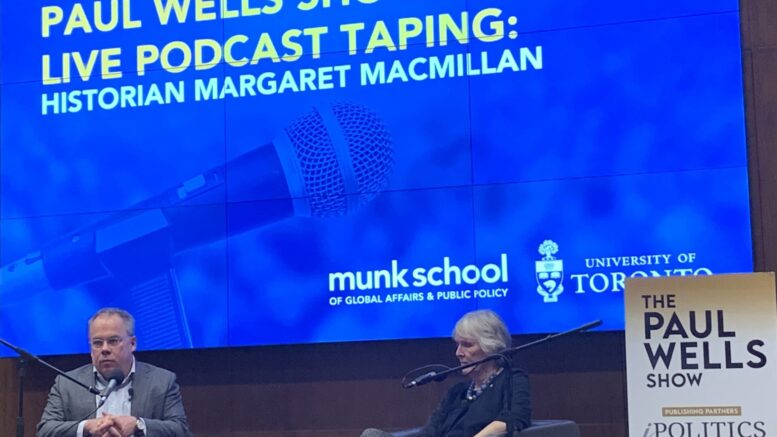玛格丽特·麦克米伦:关于乌克兰的未来,历史可以告诉我们什么?
外交事务采访 2023年6月21日 外事专访
https://www.youtube.com/watch?v=jGpbhuFVIkM&ab_channel=ForeignAffairs
外交事务邀请您收听其播客《外交事务访谈》。 玛格丽特·麦克米伦 (Margaret MacMillan) 的这一集最初发布于 2023 年 6 月 15 日。
乌克兰的反攻将成为二战以来欧洲最大规模的军事行动。 当基辅努力击退俄罗斯军队时,人们非常关注如何部署包括无人机和卫星互联网终端在内的现代技术。 但抛开这些新的先进系统不谈,乌克兰前线的战场场景看起来就像是 1916 年西部前线的场景。
对于历史学家玛格丽特·麦克米伦来说,第一次世界大战的影响远远超出了来自乌克兰的图像。 正如她在《外交事务》杂志上发表的一篇新文章中所写的那样,早期欧洲大战的经历“应该提醒我们长期而激烈的武装冲突所造成的可怕代价”。
我们讨论领导人如何决定停止战斗、历史类比的有用性,以及一场战争的结束如何为下一场战争奠定基础。
战争、重复与进步:玛格丽特·麦克米伦分享她对乌克兰战争等的看法
https://torontoobserver.ca/2023/03/11/war-repetition-and-progress-margaret-macmillan-shares-her-thoughts-on-the-war-in-ukraine-and-more/?
历史学家通常会弄错当前发生的事件,但她说,“总是会忍不住回去寻找相似之处”
保罗·威尔斯和玛格丽特·麦克米兰在芒克全球事务与公共政策学院的保罗·威尔斯秀播客节目中坐在舞台上。
保罗·威尔斯在安省多伦多蒙克全球事务与公共政策学院主持了玛格丽特·麦克米伦的《保罗·威尔斯秀》播客节目。
作者:卡莉达·汗 2023 年 3 月 11 日
著名历史学家玛格丽特·麦克米伦在多伦多市中心的保罗·威尔斯秀现场对话中表示,历史学家不擅长预测未来,而且通常会出错。
在他们内容广泛的谈话中,她还分析了俄罗斯-乌克兰战争与历史的相似之处、后COVID-19世界、她的新书的进展以及对网球的热爱。
“我认为历史不会以一种简洁、精确的方式重演,”《战争:冲突如何塑造我们》一书的作者麦克米伦说。
“尽管如此,我认为我们经常可以看到过去和现在之间的相似之处或相似之处。”
她以历史学家的身份审视时事:“我们不擅长预测未来,我们通常会弄错……” 回过头来寻找相似之处总是很有吸引力。”
麦克米伦说,历史研究开辟了可能性。 然而,作为一名历史学家,她有时羞于回答有关未来的问题。
“我想我们可以问问题。 我认为能够经常提出问题是尝试理解某些事情的开始,”她说。
她说,如果英国人和美国人更多地了解伊拉克的历史,他们就会知道伊拉克人有不喜欢外国侵略者和富有的美国人的传统。 “历史本可以帮助他们为这种可能性做好准备,”她说。
麦克米伦还透露了她正在写的一本有关第二次世界大战的书的详细信息。 它将讨论苏联大同盟中的“三巨头”与其各自领导人的关系:英国的温斯顿·丘吉尔、美国的西奥多·罗斯福和苏联的约瑟夫·斯大林。
她说,她的书着眼于这些领导人如何试图为我们今天生活的战后世界做出规划,以及战争是如何创造出这个世界的。
“他们花了很多时间,即使在战争期间,因为他们正在处理巨大的战略问题,只是花了很多时间思考下一步做什么,所以我觉得这非常有趣,”她说。
麦克米伦承认,她对普京入侵俄罗斯感到惊讶,因为“回想起来,有很多迹象”,比如俄罗斯将军队调往白俄罗斯和乌克兰边境。
“一旦你做出了这种姿态,如果你退缩,那就太愚蠢了。 所以我认为普京让自己陷入了困境,我确实认为这是普京的战争……回想起来很明显,有些事情将会发生,”她说。
“我很惊讶,我想我很惊讶,因为……我一生都生活在和平的国家,我怀疑对我们大多数人来说,战争在其他地方发生过,过去在世界其他地方发生过 ,但对我们来说不是。”
Margaret MacMillan: What Can History Tell Us About Ukraine’s Future? | The Foreign Affairs Interview
2023年6月21日 The Foreign Affairs Interview
https://www.youtube.com/watch?v=jGpbhuFVIkM&ab_channel=ForeignAffairs
Foreign Affairs invites you to listen to its podcast, the Foreign Affairs Interview. This episode with Margaret MacMillan was originally published on June 15, 2023.
Ukraine's counteroffensive is shaping up to be the biggest military operation in Europe since World War II. As Kyiv works to push back Russian troops, there is a lot of focus on how modern technology including drones and satellite Internet terminals is being deployed. But these new advanced systems aside, the battlefield scenes from Ukraine’s frontlines look like they could be from the western front in 1916.
For the historian Margaret MacMillan, the resonance of World War I goes well beyond the images coming out of Ukraine. As she writes in a new essay for Foreign Affairs, the experience of that earlier great war in Europe “should remind us of the dreadful costs of a prolonged and bitter armed conflict.”
We discuss how leaders decide to stop fighting, the usefulness of historical analogies, and how the end of one war can lay the groundwork for the next.
War, repetition and progress: Margaret MacMillan shares her thoughts on the war in Ukraine and more
Historians usually get current events wrong, but ‘the temptation is always to go back and look for parallels,’ she says

Paul Wells hosts Margaret MacMillan for an episode of The Paul Wells Show podcast at the Munk School of Global Affairs & Public Policy in Toronto, Ont.
BY KHALEDA KHAN MARCH 11, 2023
Historians aren’t good at predicting the future, and usually get it wrong, celebrated historian Margaret MacMillan said during a live conversation for The Paul Wells Show in downtown Toronto.
During their wide-ranging conversation, she also provided her analyses of the Russia-Ukraine war to parallels in history, the post-COVID-19 world, progress on her new book, and love of tennis.
“I don’t think history repeats itself in a neat, precise way,” said MacMillan, author of War: How Conflict Shaped Us.
“Nevertheless, I think we can often see parallels or similarities between the past and the present.”
She opened up on being a historian examining current events: “We’re not good at predicting the future, we usually get it wrong…. The temptation is always to go back and look for parallels.”
The study of history opens up possibilities, MacMillan says. Yet as a historian, she is sometimes shy of answering questions about the future.
“I think we can ask questions. And I think being able to ask a question often is the beginning of trying to understand something,” she said.
If the British and the Americans understood the history of Iraq a little more, she says, they would know the Iraqis have a tradition of not liking foreign invaders and wealthy Americans. “History could have helped them prepare for that eventuality,” she said.
MacMillan also revealed details on a book she is working on about the Second World War. It will discuss the relationship between the “Big Three” in the Grand Alliance of the Soviet Union and their respective leaders: Winston Churchill of Great Britain, Theodore Roosevelt of the United States, and Joseph Stalin of the Soviet Union.
She says her book looks at how these leaders tried to plan for the post-war world we live in today, and how that was created out of the war.
“They spent a lot of time, even during the war, as they were dealing with huge strategic matters, just spent a lot of time thinking about what next, and so I’m finding it very interesting,” she said.
MacMillan admits she was surprised by Putin’s invasion of Russia, because “looking back, there were so many signs,” such as when the Russians moved troops out to the Belarusian and Ukrainian borders.
“Once you make that sort of gesture, if you pull back, it’s sort of that foolish. And so I think Putin got himself into a position, and I really do think it’s Putin’s war … It was quite clear in retrospect that something was going to happen,” she said.
“I was surprised, and I think I was surprised also because … I’ve lived in peaceful countries all my life, and war has been something that I suspect for most of us have happened elsewhere, in the past in other parts of the world, but not to us.”